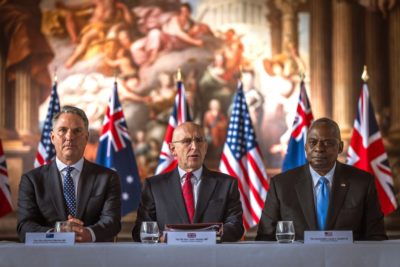100 days of Starmer: no substantial change to UK militarism

The Prime Minister’s first hundred days in power have been dissected by his supporters and political opponents alike. The timeworn metrics will include polls and analsysis of manifesto promises. With our critical military perspective, we look at the Starmer government’s actions in relation to Britain’s defence commitments and foreign policy.
It is worth starting with reference to our recent blog titled ‘Honourable and Gallant Members’: Patrician militarism prevails under Labour’. It describes Starmer’s carefully-posed speech at the National Arboretum a month before the general election. In this flag-draped setting he delivered a speech on foreign policy flanked by Labour candidates with military backgrounds. This was the culmination of a promotional strategy which stretches back through Starmer’s time in opposition. He and his team have always positioned themselves hawkishly, in close proximity to the flag and to the military.
The veterans present endorsed Starmer enthusiastically, suggesting the leader had restored their trust by breaking with the foreign policy of his predecessor Jeremy Corbyn. Though as we pointed out, on many major military matters the 2019 manifesto differed very little from the 2024 manifesto.
It is also worth remembering that, as a leading cabinet minister in 2019 Starmer himself signed up to a number of commitments with anti-militarist credentials, such as:
- respect international law and avoid needless military interventions
- introduce a War Powers Act to ensure that no prime minister can bypass parliament to commit to conventional military action
- conduct an audit of the impact of Britain’s colonial legacy
While it is too early to assess the likelihood of progress on these, recent developments are indicative of the Starmer government’s general approach to defence and foreign policy and the country’s relations with, and impact on, the rest of the world. We look at some of these early indicators here.
Chagos – self determination for islanders is still lacking
The 2019 manifesto committed to a settlement of the status of the Chagos Islands which Starmer moved forward in October.
The population of the Indian Ocean archipelago were forced out by the British in the 1960s. The island of Diego Garcia, once home to a British base, then became a strategic US military outpost. After decades of injustice and court cases and rulings (including from the International Court of Justice that the UK’s administration of Diego Garcia was unlawful), the sovereignty of the islands is to be handed back to Mauritius.
Diego Garcia will remain in UK-US use for another century, yet the move has been turned into a line of attack by right-wing politicians and press, with Starmer receiving considerable criticism. Boris Johnson reduced the issue of righting this long-standing wrong to one of ‘pure political correctness’. Questions were then raised about the UK’s commitment to contested overseas territories like the Falklands and Gibraltar. Starmer was forced to defend the move, citing an uncle who nearly died in the Falklands.
While this is a positive development, there are concerns among Chagossians about the continued use of Diego Garcia as a military base, and what Mauritian sovereignty will mean for them and their right to return, as well as consternation that they were excluded from the negotiations for the sovereignty handover.
Arms sales to Israel – a token reduction while the onslaught escalates
In early September, after nearly a year of effectively supporting Israel’s assault on Gaza, Starmer’s government announced a partial ban on arms sales to Israel. Foreign Secretary David Lammy announced the ‘suspension’ in parliament ‘with regret’ after the review concluded there had been possible illegality on humanitarian access and treatment of detainees.
The review stated that there is a ‘clear risk’ that UK arms exports to Israel ‘might be used to commit or facilitate a serious violation of international humanitarian law’. The move drew apoplectic rage from Benyamin Netanyahu yet the hold on shipments involves a mere 30 of 350 export licenses to Israel, which itself constitutes an even tinier fraction of global arms sales to Israel overall. It also excluded parts that are made in the UK for the lethal F-35 jets. Scathing in its criticism of the Labour and Conservative governments who ‘have engaged in an indescribable level of recklessness and self-interest in their approach to this conflict’, Campaign against Arms Trade continues to call for a global ban on arms transfers to Israel, including F-35 jets and components.
The implicit recognition that ‘serious violation[s] of international humanitarian law’ are occurring, which is obvious each day to the rest of the world and the international courts, has not stopped the government of Starmer – despite his early career as a human rights lawyer – from continuing to state their ‘steadfast support for Israel’s security’. Neither is the growing impact on the rest of the Middle East and the loss of life and destruction now being meted out to the Lebonese population, and the attacks by Israel on the United Nations. Despite the government restoring humanitarian funding to Unrwa and dropping objections to arrest warrants for Netanyahu and his defence minister, this government’s ‘dehumanisation’ and ‘spinelessness’ is ‘only marginally less bad’, than the previous one. The recent more urgent calls for a ceasefire only seem an option for this government when the US deems it strategic to do likewise, unlike France which has done far more to halt the supply of arms to Israel.
Such perversity can perhaps be partially explained by the UK’s long-term military and economic partnerships with Israel. Under Starmer’s leadership, the UK has continued spy flights for Israel, allowed the US military to operate through its Cyprus airbase, and launched fighter jets in support of Israel during Iran’s recent strikes. These pacts are clearly benefiting the extreme right-wing government of Israel in direct and less direct ways, but have led the UK into a(nother) ethical quagmire.
Ukraine – assistance and ammunition
Volodymyr Zelenskyy’s state visit in October saw Starmer reiterate ‘the U.K.’s ironclad support for Ukraine in the face of ongoing Russian aggression’. At their first bilateral meeting in July not long after taking office, Starmer had already made a number of pledges, including a promise of:
…£40 million to NATO’s Comprehensive Assistance Package for Ukraine. The UK is the third largest donor to the Package, ensuring Ukraine can access vital assistance in key areas including counter drone protection, demining of recaptured land and medical rehabilitation of its injured military personnel.
He also promised material support in the form of large orders of ammunition – via the UK-administered International Fund for Ukraine – worth £300 million. The recent meeting of G7 defence ministers pledged ‘unwavering support’ for Ukraine but was less enthusiastic about Zelenskyy’s ‘victory plan’, which includes that Ukraine would join NATO immediately.
The Ukraine war has had a number of impacts across the world from soaring food prices to massive increases in military spending and arms firm profits. An end does not appear in sight ahead of the forthcoming US elections, which some feel may be critical to the western posture on the war.
Arms trade analyst Sam Perlo-Freedman has suggested a number of measures which could help diminish the violence and the risks of global conflagration. These include working in negotiations, re-calibrating Britain’s role in the international order and enforcing nuclear treaties. None of them involve the massive arming of Ukraine, with all its implications.
The current path of ever-escalating mutual militarisation offers only endless war, with a very real risk of direct confrontation between nuclear powers. A better way needs to be found.
Starmer, who made much of his career as a human rights lawyer before entering politics, is now well-positioned to carry these ideas forward yet is unable to break free of the militaristic was of operating.

Secretary of State for Defence John Healey, Australian Deputy Prime Minister and Defence Minister Richard Marles and the US Secretary of Defense Lloyd J. Austin III, at an AUKUS Defense Ministerial Meeting at the Old Royal Naval College, London, in June 2024, to establish the strategic and operational framework for cooperation under the AUKUS defence partnership. Photo: Chad J McNeeley/DoD copyright
The defence review – more of the same
Starmer promised a new strategic defence review ahead of the elections and this is now underway. Led by Lord Robertson, Dr Fiona Hill and General Sir Richard Barron, the review offers very little opportunity to think outside the box and is unlikely to be much different than those conducted under Tory rule. Its terms of reference state:
The UK faces threats that are growing and diversifying: war in Europe; conflict in the Middle East; states across the world that are increasingly acting in ways that challenge regional and global stability as well as our values and interests; terrorist groups; hybrid attacks; and instability caused by climate change.
It restates commitments to Ukraine, Middle Eastern allies, NATO, nuclear deterrent and the AUKUS pact with the UK’s pacific allies. It also looks likely that the defence industry will continue to be privileged despite its proportionately small contribution to the economy and jobs; the purpose of the review is partly characterised as ‘ensur[ing] that Defence is central both to the security, and to the economic growth and prosperity, of the United Kingdom.’
Our colleagues at Rethinking Security note that the intention of the review seems to be about ‘strik[ing] a reassuring note on policy continuity’:
…the Review is clearly looking for improvements in priority areas – such as support for NATO, Ukraine, and other allies, and achieving domestic resilience – and hoping to detail how to become more modern and integrated in a cost-effective way – rather than pushing for much new strategic thinking or emphasising how defence connects to wider policy and strategic issues.
They also suggest the review remains effectively siloed off from public intervention, instead favouring the specialist insider:
The language of the propositions is clearly inviting for insiders versed in the relevant terminology – but is likely to intimidate outsiders, increasing the risk that defence policy will remain in the hands of a narrow subset of people. This is a marked contrast to the more inviting and participatory approach taken, for example, in neighbouring Ireland.
The online public consultation may tick the consulting-widely box but the format creates even greater hurdles for those – particularly from civil society – who are championing sustainable security and more ethical approaches, to be heard.
Business as usual
One hundred days into government, Starmer’s Labour has made a number of small adjustments but while steps towards Chagossian sovereignty and reducing arms licences for Israel are better than none, they are token and inadequate.
On the evidence of this period the UK government seems determined to hold to the old patterns of militarism, maintaining aggressive foreign policy and alliances that determine policy options – most critically, with Israel. Early opportunities for even modest shifts towards a wider understanding of security or a more ethical approach (the Blair government did at least start with that ideal for foreign policy) have been missed.
On current form – and particularly in light of the scenes in Gaza and Lebanon – the Labour government is adding to global instability in a way which may be viewed by history as having exceeded the impacts of the wars in Iraq and Afghanistan that haunted the last Labour government.
See more: military in society, UK Parliament, arms trade, defence & foreign policy
Like what you read?
> Sign up for our newsletter or blog notifications
> Support our work – from just £2 a month










